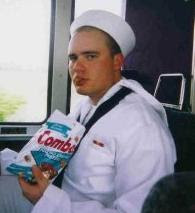Tallahassee Democrat, Monday, Sep. 11, 2006
In the terror, we find connections
By Adam Weinstein
Everyone has a 9/11 story. Mine has a difference or two.
You see, the terrorist attacks on Sept. 11 saved my grandmother's life. I haven't told that story much in the past five years. But I want to tell it now.
Sept. 11 was a Tuesday, the second day of my senior year at Columbia University. It was warm and bright when I woke up. To the north, I could see sunlight glint off Yankee Stadium's steel crown. To the south, though, there was a cloud touching the Lower Manhattan pavement, crawling slowly toward Brooklyn.
I spent the morning walking toward that cloud, hoping to check up on a family friend who worked downtown. At the Flatiron Building, I permitted myself a glimpse skyward. To the building's right, the sky was a shocking late-summer blue that every New Yorker knows. To the left, black matter obscured all daylight at ground level. Above that, lighter wisps of gray curled off and rose upward, like the souls of those killed transiting to a more peaceful scene.
I silently cursed myself for such a sappy thought in the midst of all this murder and terror. But then I noticed that everyone around me - joggers, businessmen, students, cops, cabbies - stared at that cloud the same way. We were all joined intimately in our pain and fear, as close as humans probably ever get, and we all wished it hadn't taken this blow to make us so respectful of each other.
That cloud lingered as we tried to donate blood in mile-long hospital lines.
That cloud lingered as my college tried to resume classes, two days later. Few of us showed up.
That cloud lingered as I retreated north, away from the city, on a train bound for my family's hometown in the Hudson Valley.
As I hid upstate, a friend could tell I was still wrestling with that cloud when she told me, "You should look up your grandmother. Try to take your mind off things."
That grandmother was the last living relative of mine in this Catskill Mountain town, a shut-in, a stereotypical "crazy cat lady" about whom I knew very little. That distressing September week seemed a fitting time to reconnect with her.
Only she didn't answer my phone calls. Nor did she open the door to her apartment when I came knocking. But I could hear her calling, faintly, through a window. I broke in.
So it was that I reunited with my grandmother on a linoleum kitchen floor, where she had fallen two days earlier, unable to rise or yell for help. Cancer had spread to her brain and thrown off her balance.
Two years later, the cancer took her away, but not before I helped her into a hospice, visited her, and swapped stories and familial sentiments.
Somewhere in all this, around the anniversary of the day that cloud changed all of us, it sunk all the way in: If not for the horrors of 9/11, if terror hadn't chased me upstate, I never would have called on my grandmother.
And neither would anyone else.
In some respects, it's a story like anyone else's. We connect with each other by sharing how we suffered - and coped.
And yet, my recollections are so contrary to the story lines we've come to expect out of 9/11. One of the less-fortunate expectations we've developed is that the tellers of these stories usually have agendas. 9/11 has been invoked so often to sell copy and make political arguments that it falls on our ears nowadays with a dull, familiar thud. We survivors are all ready to get on with our lives. But we cannot completely forget.
Maybe the answer is to trademark the name "9/11" itself. We could levy a tax on everyone who invokes it. Everyday folks sharing their points of view could pay only a few cents. TV pundits and politicians would have to fork over huge sums.
Instead of giving this money to any charity, individual or government, we could just convert it into pennies and save it until the next anniversary rolls around. On that day, in a simple ceremony at Ground Zero (that name, too, will have to be trademarked), we could pour all the pennies into a monumental container for the world to see, so that our remembrance of 9/11 - how we did it and how often - would itself become a part of the public record.
Until then, though, consider this my two cents' worth of remembrance.





